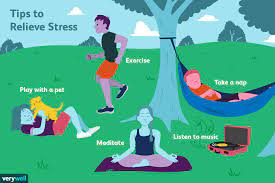Table of Contents
ToggleHow to Transform Stress into Power and Fulfillment in 2025
Stress Management, Motivation Strategies, Cultivating Virtues, Anxiety and Stress Relationship, Wellness, and Well-being, Balancing Modern Life, Virtues for a Fulfilling Life, Inner Peace, and Happiness, Strategies for Tension Reduction, Positive Mindset Development

1. What is stress?
Stress is how we react when we feel under pressure or threatened. It usually happens when we are in a situation that we don’t feel we can manage or control.
When we experience stress, it can be as:
- An individual, for example, when you have lots of responsibilities that you are struggling to manage
- Part of a group, for example, if your family is going through a difficult time, such as bereavement or financial problems
- Part of your community, for example, if you belong to a religious group that is experiencing discrimination
- A member of society, for example, during natural disasters or events like the coronavirus pandemic
If you feel stress as part of a bigger group, you may all experience it differently. This can happen even if the cause of your stress is the same.
2. Transforming Stress into Motivation, Power and Fulfillment

In the fast-paced modern world, transforming Stress into Motivation and Well-being is not an impossible objective to achieve in any way. It has become an inevitable part of our lives. While tension in small doses can be a driving force, chronic stress can take a toll on both physical and mental health. In this article, we will explore the relationship between stress and anxiety, strategies for managing it effectively, and how cultivating virtues like contentment can contribute to a more fulfilling life.
3 . Understanding Stress and Anxiety: Not the Same

It is the body’s natural response to challenges, acting as a motivator in small amounts. However, chronic strain can adversely affect both physical and mental well-being. Anxiety, on the other hand, is a persistent feeling of worry or unease about uncertain outcomes. Chronic anxiety can interfere with daily life and contribute to various mental health disorders.
4 . Managing Strategies for a Balanced Life
- Identify the Source: Understanding the specific factors causing it is the first step in addressing it. Develop a plan to tackle these stressors head-on.
- Take Control: Empower yourself by setting goals and creating a plan. Regaining control can significantly reduce anxiety levels.

Take Control, Deep Breathing -

Meditation Prioritize Relaxation: Allocate time for relaxation and self-care. Engage in deep breathing, meditation, yoga, or exercise to alleviate strain and enhance overall well-being.
- Seek Support: Share your anxiety with trusted friends or loved ones. Professional support from therapists or counsellors can also be instrumental in managing stress effectively.

Seek Support. Free Exposure Therapy - Stay Positive: Cultivate a positive mindset to counter negative thoughts. Focusing on the positive aspects of life can alleviate strain and improve mood.
- Practice Gratitude: Acknowledge and appreciate the things you are grateful for. Maintaining a gratitude journal or expressing gratitude can contribute to reducing distress.

Practice Gratitude -

Stress Reduction Techniques Regular Exercise: Incorporate regular exercise into your routine. Activities like walking, running, or yoga not only improve physical health but also contribute to strain reduction.
- Ensure Quality Sleep: Establish a consistent sleep schedule and create a relaxing bedtime routine. Quality sleep is crucial for managing anxiety and maintaining overall health.

Adequate Quality Sleep
5 . Reasons Behind Its Modern Surge
Several factors contribute to the increased prevalence of stress, anxiety, and even depression in today’s society:
- Increased Demands: The fast-paced, demanding lifestyles many people lead today can lead to heightened stress and anxiety levels.
- Technological Advances: While technology brings benefits, the “always-on” culture can create constant connectivity, resulting in increased pressure and strain.
- Social Media Impact: The rise of social media has led to increased strain for some individuals. The pressure to present a perfect online image can contribute to feelings of inadequacy.
- Societal Changes: Shifts in societal expectations and support systems contribute to heightened stress and anxiety.
- Improved Mental Health Awareness
Today, mental health conditions are more widely recognized and treated. In the past, these conditions may have gone undiagnosed and untreated.
6 . The Virtue of Contentment: A Shield Against Greed

Contentment stands as a virtuous counterbalance to the negativity associated with greed. Unlike the relentless pursuit of more, contentment brings a sense of satisfaction and peace with what one possesses. Cultivating contentment can lead to inner peace, happiness, and a genuine concern for others.
7 . Cultivating Virtues for a Fulfilling Life
While contentment, patience, and thankfulness are valuable virtues, considering additional virtues can contribute to a more well-rounded life:

- Honesty: Being truthful builds trust and strengthens relationships.
- Respect: Demonstrating respect creates a positive and harmonious environment.
- Fairness: Acting justly builds trust and strengthens relationships.
- Responsibility: Taking responsibility for actions demonstrates character and integrity.
- Perseverance: The ability to persevere through challenges builds resilience and determination.
- Courage: Facing challenges with courage and doing what is right even when difficult is a valuable virtue.
- Compassion: Showing concern and understanding for others contributes to positive relationships and a caring environment.

Compassion
In conclusion, understanding and managing stress are essential for a balanced life. Cultivating virtues like contentment and expanding to include honesty, respect, fairness, responsibility, perseverance, courage, and compassion can contribute to a more fulfilling and meaningful existence. Strive for a life where these virtues become guiding principles, unlocking the power within to transform stress into motivation and well-being.



